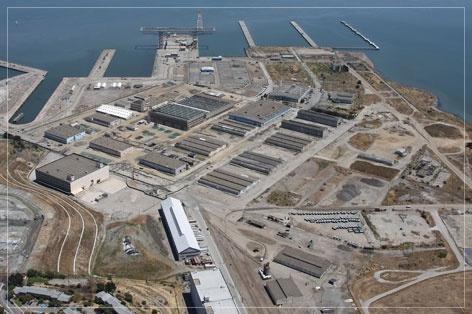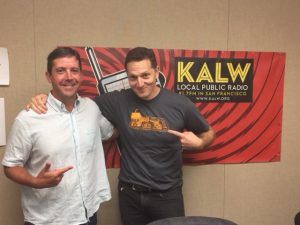 Some residents of San Francisco’s Bayview neighborhood feel like they’ve been lied to by the government about the toxicity of the adjacent Hunters Point Shipyard. The Navy used the area for decades as a nuclear energy and waste facility. After the Navy left, it became a designated Superfund site and underwent a major cleanup effort.
Some residents of San Francisco’s Bayview neighborhood feel like they’ve been lied to by the government about the toxicity of the adjacent Hunters Point Shipyard. The Navy used the area for decades as a nuclear energy and waste facility. After the Navy left, it became a designated Superfund site and underwent a major cleanup effort.
Yet while San Francisco has big plans to develop the site, questions remain about falsified soil tests, the health of Bayview residents, and the government’s failure to protect these communities of color.
On tonight’s City Vision we explore the accusations of environmental racism around the Hunters Point Shipyard clean up. Joining me to discuss will be:
- Sheridan Enomoto – Community Organizer and Policy Advocate for Greenaction for Health and Environmental Justice.
- Theo Ellington – Resident of Parcel A in the Hunters Point Shipyard, member of the San Francisco Human Rights Commission, and candidate for Supervisor representing Bayview Hunters Point.
- Lindsey Dillon – at UC Santa Cruz, author of an upcoming book on the history of the Hunters Point Shipyard.
Tune in at 7pm or live stream. Hope you can join the discussion!
 Psychedelics are making a comeback. But is America ready? Tonight on City Visions, we’ll explore the history and new therapeutic applications of psychedelic drugs.
Psychedelics are making a comeback. But is America ready? Tonight on City Visions, we’ll explore the history and new therapeutic applications of psychedelic drugs.
How are these substances being used in the treatment of addiction, depression, anxiety and PTSD? Are we near a “post-prohibition” era? And if so, what does it look like?
Joining me to discuss will be:
- Dr. Charles Grob, professor in the departments of psychiatry and pediatrics at the UCLA School of Medicine.
- Don Lattin, author of “Changing Our Minds: Psychedelic Sacraments and the New Psychotherapy,” former staff writer for The San Francisco Chronicle.
Tune in (and don’t drop out) or live-stream at 7pm, and call or email with your questions for the panel!
 At the end of March, three electric scooter companies deposited over 2,000 scooters onto San Francisco streets. Controversy immediately ensued.
At the end of March, three electric scooter companies deposited over 2,000 scooters onto San Francisco streets. Controversy immediately ensued.
Some supported the scooters as an environmentally sustainable alternative to private cars or Uber or Lyft, while others considered them to be under-regulated nuisances that clog the streets and sidewalks and detract from public transportation.
They have since sparked a conversation about personal mobility in urban environments, involving electric bikes, electric skateboards, hoverboards, and others.
As scooter numbers increase, what are city officials and the scooter companies doing to address the concerns and realize the potential benefits? Do scooters and other new modes of urban personal mobility solve more problems than they create?
We’ll discuss tonight at 7pm on City Visions, KALW radio 91.7 FM in the San Francisco Bay Area. Joining me will be:
- Cheryl Brinkman – Chairman of the Board of Directors, San Francisco Municipal Transportation Agency, or SFMTA.
- Susan Shaheen, Ph.D. – Co-Director of the UC Berkeley Transportation and Sustainability Research Center and Director of Innovative Mobility Research.
Tune in or live-stream and make sure to call or email with your questions for the panel!
On Monday night, I hosted a discussion on City Visions on the impacts on California of the new federal tax law. You can listen to the audio, but here are some of my takeaways from our expert panel:
- The new law was mostly about making the U.S. corporate tax rate competitive with other countries through a massive cut. Nations are now apparently in a “race to the bottom” to keep corporate profits in-country by lowering their rates, and this bill only ups the ante.
- The corporate changes will likely face challenges under World Trade Organization provisions.
- Many of the individual tax benefits are temporary and set to expire in the coming years.
- High cost “blue state” efforts to blunt the impact to their taxpayers from the loss of state and local tax exemptions are unlikely to be viable in the long run. Whether states set up a charitable fund for people to pay state taxes (as California is seriously contemplating) or shift income taxes to employers (as New York is investigating), the IRS and/or Congress is likely to challenge these arrangements, creating uncertainty going forward that most taxpayers won’t want to bear.
- In the long run, the best way for states to minimize the impacts of the bill on their taxpayers is through new federal legislation.
- The bill is incredibly complex, and because Republicans never held a single hearing on it, it’s riddled with errors and oversights that will need to be corrected.
- Some taxpayers will be in for a big shock, such as those who recently got divorced and were planning to deduct alimony payments but can now no longer do so. Overall, most people have no idea at this point how the law will affect them.
Ultimately, this is a good time to be a CPA, as Californians (and most Americans) will be sifting through the changes in this law for months — if not years — to come.

Matt Ross of HBO’s Silicon Valley shows off his KALW gear before our Monday night interview on City Visions
Whether you live in the Bay Area or not, local public radio stations like KALW, where I host City Visions, offer vital perspectives and reporting during a time where dependable, nonprofit news can be hard to find. KALW is in the middle of its pledge drive this week and next, so I encourage you to go to KALW.org and click on ‘donate’ up top on the right to support the station.
As an example of KALW programming, this week I had the pleasure of interviewing HBO’s Silicon Valley star Matt Ross for an hour on City Visions. He’s a local actor who can share his experiences and insights with our listeners, live in the studio, all because of the platform KALW provides. It’s an hourlong discussion with the community, and it’s typical of the kind of programming on KALW.
I hope you’ll consider supporting the station. And as always, thanks for listening to KALW and shows like City Visions!
The new president sworn in last Friday caps one of the most tumultuous presidential election campaigns in our country’s history. Amid allegations of foreign interference, proliferation of “fake news,” gerrymandering, voter restriction laws, government investigations of the candidates and their advisors, and leaked emails, Americans trust in government and the media is at an all-time low.
Yet trust in these institutions and in a free and fair election is a bedrock principle of our democracy. With declining confidence in this system — and its vulnerabilities on harsh display in this last cycle — what is the future of democracy in America?
I’ll host a discussion on this question tonight at 7pm on City Visions, KALW 91.7 FM. My guests will include:
- Yascha Mounk, lecturer on Government at Harvard University, a Fellow in the Political Reform Program at New America, and a Fellow at the Transatlantic Academy of the German Marshall Fund
- Paul Pierson, the John Gross Professor of Political Science at the University of California, Berkeley.
For those outside of the Bay Area, you can stream the broadcast here. I hope you can join and bring your questions to the show!


